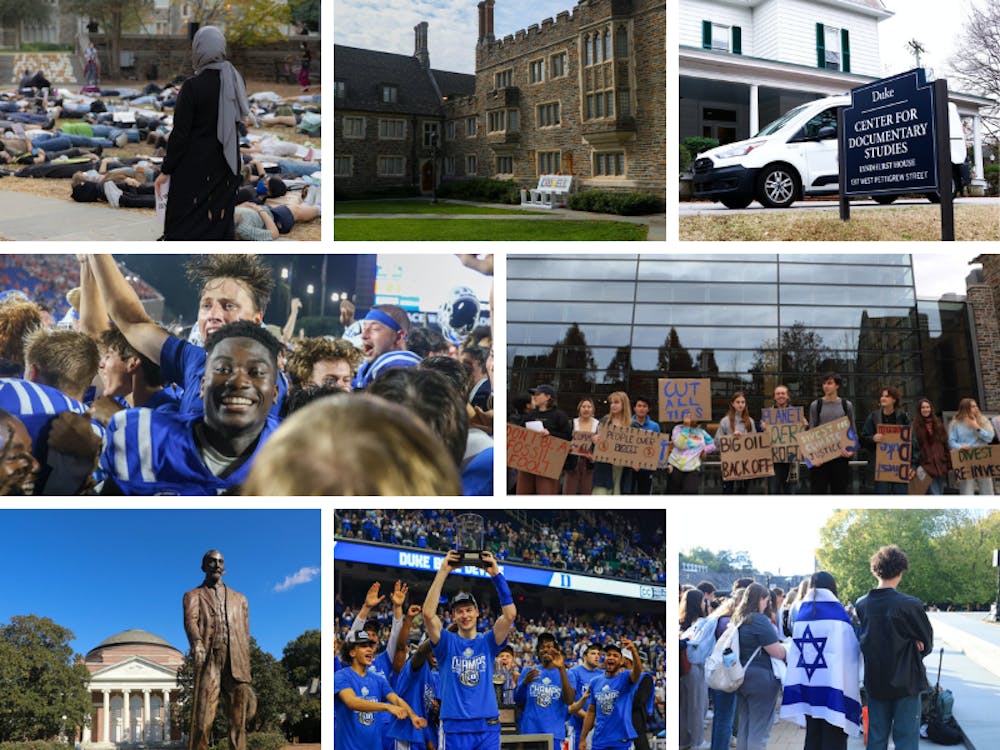As Duke closes out a monumental year, The Chronicle looks back at the biggest stories of 2023 — a year marked by the beginning of a new Carolinas financial aid program, continued demands by campus activists and the end of the University’s COVID-19 pandemic restrictions.
Affirmative action, admissions and academics
The week before the U.S. Supreme Court overturned race-based affirmative action in college admissions, Duke announced that it would provide full tuition grants for undergraduates from the Carolinas with family incomes below $150,000. The program will also be supported by a $100 million award from The Duke Endowment, the largest single award to the University in its history.
Though the future of admissions at Duke and other competitive universities remains unclear, administrators believe the Carolinas program has encouraged more students to apply, after receiving a record number of Early Decision applicants and a 25% increase in students admitted from the Carolinas compared to last year’s Early Decision results.
Still, Duke could not escape scrutiny about its limited socioeconomic diversity. A September New York Times Magazine article described the University as among the “least economically diverse” elite colleges, despite being on par with its peers in the past. Although President Vincent Price later wrote that the article cast the University “in a rather harsh light,” students and first-generation, low-income alums agreed with the article’s findings.
The same year Duke climbed to No. 7 in the U.S. News rankings, its medical school withdrew from the Best Medical Schools ranking, joining Duke School of Law and other elite colleges concerned with the rankings’ methodologies and purposes.
In March, Trinity College of Arts and Science’s Curriculum Development Committee presented a first look at its new undergraduate curriculum’s priorities. The committee, which has collected feedback from students and faculty alike, hopes to present a final proposal in March and has discussed the possibilities of everything from mandatory first-year clusters to a winter term.
A continually changing campus

The year also saw the end of COVID-19 pandemic-era restrictions that marked the start of many students’ college experiences. By March, masks on buses were no longer required. In April, Duke ended its COVID-19 vaccine requirement for most students, faculty and staff.
For students studying at Duke Kunshan University, the end of these restrictions comes at a slower pace. The campus, which welcomed its first in-person class in four years and completed the second phase of its campus construction over the summer, still held online classes in fall 2023, putting a damper on efforts to develop a distinct campus culture.
The QuadEx residential program started to take root, adding new Experiential Orientation programs for the Class of 2027 and releasing the first designs for its Quad arches. At the same time, students across class years had mixed reactions to the new housing system. Some chapters of Duke-affiliated Greek life are still recovering from the effects of the COVID-19 pandemic while adjusting to QuadEx.
Meanwhile, several Duke centers and affiliates have struggled this past year. Duke Student Affairs saw a series of staffing shortages, hampering student group funding and planning for cultural events. The Center for Documentary Studies, a nonprofit affiliate of Duke, has undergone a programmatic overhaul over the past year.
Campus demonstrations, protests and activism

Hamas’ Oct. 7 attacks in southern Israel and the ongoing Israel-Hamas war shook Duke’s campus. Two days after the attacks, Jewish and Israeli community members held a vigil mourning the lives lost and attesting to the strength of Duke’s Jewish community, a message emphasized in subsequent displays and gatherings.
Pro-Palestinian students and faculty members criticized Price’s initial statement condemning the Oct. 7 attacks and subsequent violence, arguing that the statement lacked nuance by not mentioning Palestine. Hundreds of community members have joined public calls for a cease-fire in Gaza, even as some students express that they feel threatened on campus and criticize Duke for not supporting students subjected to harassment.
The Free Expression bridge evolved in the following months as well. In October, Duke painted over the phrase “from the river to the sea, Palestine will be free” on a pro-Palestinian mural after receiving multiple reports that the phrase was antisemitic. Before the expression was removed, another party painted the addendum “from Hamas” next to the phrase, making it read “from the river to the sea, Palestine will be free from Hamas.” Pro-Palestinian students alleged that their mural was later graffitied multiple times with the word “Hamas.”
The University celebrated the first anniversary of its Climate Commitment, though some students believe that it still has not done enough. Students from the Duke Climate Coalition have continued pushing for the University to divest from fossil fuels, publishing a report in December about University research funded by the fossil fuel industry.
The Duke Graduate Students Union also made big moves this year. The union filed for an election with the National Labor Relations Board in March after a successful card drive in fall 2022. Duke unsuccessfully challenged a 2016 NLRB decision affirming the legal right for graduate students to unionize, and doctoral students voted overwhelmingly in favor of unionization. Now NLRB-certified, the DGSU is in the process of negotiating a contract.
The Center for Gender Violence Prevention and Intervention found a permanent director after a year-long search. Some students, frustrated and confused by the Center’s rollout, have taken on the responsibility of raising awareness of sexual assault on college campuses.
Durham and beyond
In May, Republican legislators in the NCGA overrode Gov. Roy Cooper’s veto of Senate Bill 20, which prohibited abortions after 12 weeks with limited exceptions, after N.C. state Rep. Tricia Cotham shifted the supermajority in the Republican Party’s favor by changing her party affiliation in April.
As students shared split opinions over the new law and its implications, Planned Parenthood South Atlantic and Beverly Gray, associate professor of obstetrics and gynecology at Duke, filed a lawsuit against the ban in June. Three months later, a federal judge temporarily blocked two provisions of the ban from taking effect.
In June, the U.S. Supreme Court ruled against North Carolina Republicans, who proposed maps that would have likely given them control over 10 of the state’s 14 districts. The NCGA’s new maps, which will likely give Republicans three additional seats in the House of Representatives, are now the subject of a federal lawsuit alleging that the maps are racially gerrymandered.
Durhamites chose Leonardo Williams as their next mayor in November, as well as incoming city council members Javiera Caballero, Nate Baker and Carl Rist.
In August, Tailei Qi, a doctoral student at the University of North Carolina at Chapel Hill, fatally shot Zijie Yan, an associate professor in UNC's department of applied physical sciences and his academic adviser.
Students expressed frustrations with Duke’s emergency response, which alerted some students three hours after initial reports of a shooting at the Chapel Hill campus. Meanwhile, faculty members reported underutilization of emergency preparedness training in the month after the shooting.
Patrick Anthony Rowland, a Duke undergraduate who accompanied UNC first-year Elizabeth Grace Burton the night she fatally overdosed on campus, was sentenced to three months in federal prison for distributing drugs.
A big year for sports

Spring was busy in Blue Devil sports, headlined by an improbable run to the NCAA Super Regionals by Duke baseball, Duke softball hosting its first-ever Super Regionals, women’s track and field winning the ACC title by a record margin and a national title game berth by Duke men’s lacrosse and Tewaaraton Award winner Brennan O’Neill.
Fall carried over the high-octane nature of spring. Duke football, in Mike Elko’s second season as head coach, started with a bang with its Week 1 home upset of then-No. 9 Clemson, hosted ESPN College GameDay for the first time in its history and peaked with a national ranking of No. 16, taking teams like Notre Dame, Florida State and North Carolina to the wire.
Field hockey also made waves with runs to the ACC tournament final and NCAA Final Four, while cross country star Amina Maatoug earned a remarkable ninth-place finish at the NCAA Championships.
Enter wintertime, and both Duke men’s and women’s basketball began their seasons on the hardwood of Cameron Indoor Stadium. Head coach Jon Scheyer and his No. 2 preseason-ranking team faced tough sledding early in the season against Arizona and Arkansas, before nabbing two crucial neutral-site wins against Michigan State and Baylor. Kara Lawson and the women’s team showed flashes of its potential and the talent of its youthful roster.
But the football bug bit again. Elko made a surprise departure to Texas A&M late at night in November. The Blue Devils found a new head of state in former Penn State defensive coordinator Manny Diaz, but not before a slew of players and coaches made their way out the doors. Duke finished the year with a second bowl game win in as many years — a fitting cap to two remarkable seasons for a Blue Devil team.
Read more about the biggest stories of the year
The Chronicle's 2023 Top 10 stories of the year in Duke athletics
Get The Chronicle straight to your inbox
Signup for our weekly newsletter. Cancel at any time.

